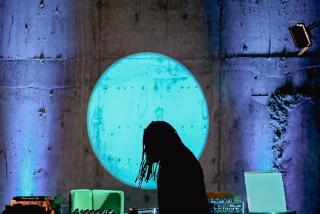UP, DOWN, UP JOURNEY OF KIHN BAND
- Share via
SAN DIEGO — Greg Kihn laughs when he’s reminded of his group’s reputation as “America’s greatest bar band.”
“What can I say? It’s true,” said the 33-year-old guitarist, singer and mastermind behind the Greg Kihn Band, which appears here Sunday at Mony Mony’s nightclub, across from the Sports Arena.
“We really do shine in clubs,” he said. “We sound best playing live before a small audience, and I really see clubs as the backbone of rock ‘n’ roll--there are acts on their way down and on their way up, so you get a real melting pot of music.”
It’s a good thing he feels that way. Over the course of 10 years and as many albums, the Greg Kihn Band’s roller coaster career has taken it out of the nightclubs and into the large concert halls--and back again--more times than he can remember.
“Every time we score a big hit, we make the jump into larger halls,” Kihn said. “But as soon as we’re out of the Top 10, we go back to the clubs, which have always been our bread and butter.”
Just last year, Kihn said, his band had another hit with “Lucky” and found itself on the concert level once again.
But that song has dropped off the charts, and on the band’s current tour, in support of its newest album, “Love and Rock ‘n’ Roll,” most of the dates are back in the clubs.
“Most big acts won’t do this,” Kihn said. “They ride the success of whatever hit they happen to have on the charts, and then they stop touring completely until they have another hit.
“But our band doesn’t work that way. I want to work as often as possible, and if that means going back to the clubs every now and then, I see nothing wrong with it.”
Kihn said his band, even when playing larger halls or opening stadium shows for such superstars as the Rolling Stones, never puts much emphasis on elaborate stage shows with fancy lights and smoke machines.
“I’ve always had a problem with that,” he said. “I find it pretentious. Most of the bands of the video generation look and sound fine on camera, but are unable to deliver live. And that’s sad because, to me, rock ‘n’ roll is a live medium.”
When “Jeopardy” gave the Greg Kihn Band its first No. 1 hit three years ago, Kihn said, the group found itself headlining a major concert tour for the first time.
“And there was all this pressure on us to have a big production that would require us to rent four semis each night we went on stage, just to play ball with the heavies,” Kihn recalled.
“But I didn’t go along with that. A rock ‘n’ roll show shouldn’t be wrapped up in sound and lights; it should begin and end with the music, and all that other stuff is just frills.
“Consequently, it’s a lot easier for us to go back to the clubs when we have to. There’s no fancy stage show to lug around on the road; no matter where we play, in a tiny club or a major stadium, we play the same music the same way we always do.”
Born in Baltimore, Kihn got his start in music as a guitar-strumming songwriter playing solo in East Coast coffeehouses. In the early 1970s, he moved west, first to Los Angeles and then to San Francisco.
After unsuccessfully trying to land solo gigs around the Bay Area, he got a job as a clerk at Rather Ripped Records, the famed Berkeley record store where Patti Smith gave poetry readings and Iggy Pop did most of his shopping.
“One day I ran into a guy who owned a club called the Longbranch, and he told me, ‘Too bad you don’t have a band; I’d give you a gig,’ ” Kihn said. “So I lied and told him I had a band, just to get the gig.”
Almost overnight, Kihn said, he put together a rock band that played mostly simple, upbeat originals and covers of songs by artists like Bruce Springsteen.
Within several weeks of its on-stage debut at the Longbranch, the group had become the club’s house band--and a year later, in 1975, they were signed by Beserkley Records, a tiny independent label that issued the band’s first single as part of a six-pack Bay Area rock “sampler.”
Two years later, Beserkley signed a distribution deal with Elektra Records, and the Greg Kihn Band was one of only two acts selected to record an album for national release.
At first, commercial success was slow in coming, but by 1979 the group had amassed a sizable cult following and Bruce Springsteen, impressed by the band’s earlier treatment of some of his songs, wrote “Rendezvous” especially for them.
That song became the Greg Kihn Band’s first bona fide hit, albeit a minor one. But from then on, the band’s popularity grew until it became a mainstay on the national Top 40 with songs like “The Break-Up Song,” “Jeopardy,” and about half a dozen others.
All the while, Kihn maintains, the band’s sound never changed from the basic, simple rock ‘n’ roll it had been playing at the Longbranch. As a result, he is baffled by all the labels the band has been stuck with in the last decade.
Among the band’s first gigs were opening dates in England for new wave pioneers like the Sex Pistols and The Damned, “and all of a sudden, we were a punk band.”
Then came The Knack and the late 1970s power pop explosion, and the band was lumped into that category as well. Most recently, “Jeopardy” rose high on the dance charts, alongside songs by more traditional “disco” artists like Prince and Michael Jackson.
“But we predate all that stuff by at least a couple of years,” Kihn said. “All we’ve ever done is play basic rock ‘n’ roll, simple and melodic. People can call us what they like, but that’s not going to change our music.”
More to Read
The biggest entertainment stories
Get our big stories about Hollywood, film, television, music, arts, culture and more right in your inbox as soon as they publish.
You may occasionally receive promotional content from the Los Angeles Times.










